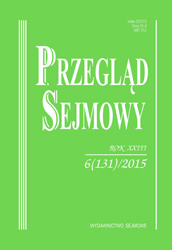Posłowie i senatorowie w składach gabinetów II Rzeczypospolitej w latach 1919−1939. Prawo i praktyka parlamentarna
Deputies to the Sejm and Senators in the Memberships of Cabinets of the Second Republic of Poland in 1919−1939: Parliamentary Law and Practice
Author(s): Piotr A. TusińskiSubject(s): History of Law, Political history, Recent History (1900 till today)
Published by: Kancelaria Sejmu
Keywords: parliamentarism; parliamentary-cabinet system; parliamentarisation of ministerial posts, interpenetration of the legislative and executive powers; constitutional customary law; positive constitutional
Summary/Abstract: Political and parliamentary systems of the Second Republic of Poland in the first years of its existencewas based on the European continental models, mostly the French ones. This remark concerns alsothe issue of parliamentarisation of ministerial posts, also referred to as mutual interpenetration of thelegislative and executive powers. During the operation of the Legislative Sejm (1919–1922) the legalbasis of constitutional practices in this area was provided by customary law, raised to constitutionalrank under the Basic Law of 1921 and — despite the formal break with a parliamentary-cabinet systemprovided for by April Constitution of 1935 — effectively operating as positive-law norm of an ordinarystatute. The characteristic traits of Polish parliamentary practice of the 20-year interwar periodinclude: extension of the possibility of holding positions in government jointly with the exercise of aparliamentary mandate on the offi ce of the undersecretary of state, parliamentary ministers serving onthe so-called expert (non-parliamentary) cabinets and the participation of expert Ministers (in 1919–1922 even numerically predominating) in the composition of “ministries” created by a coalition ofSejm (parliamentary) factions. The practice of appointing Deputies and Senators to governments wascontinued in the period following the May coup, and even intensifi ed in the 1930s, despite the fact thatthey were of a purely extra-parliamentary nature. It should be noted, however, that if under the parliamentary-cabinetsystem the mutual interpenetration of legislative and executive was aimed, in general,to enhance cooperation between these two constitutional institutions, under the reign of Sa nacja itrather refl ected either the fi ght against parliamentarism (breaking the internal cohesion of politicalgroups represented in the Sejm) or political and personal struggles within its leadership.
Journal: Przegląd Sejmowy
- Issue Year: 2015
- Issue No: 6
- Page Range: 103-130
- Page Count: 28
- Language: Polish

